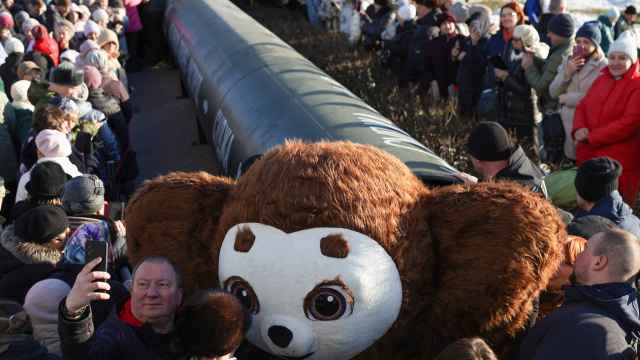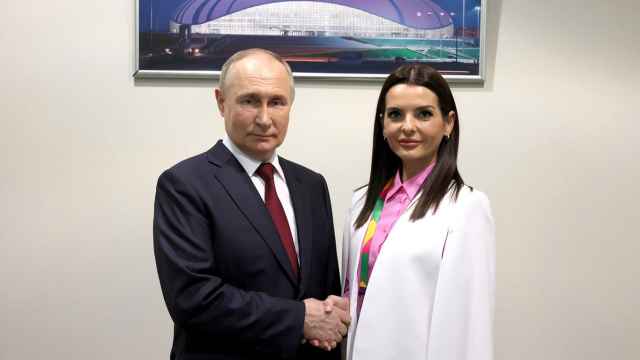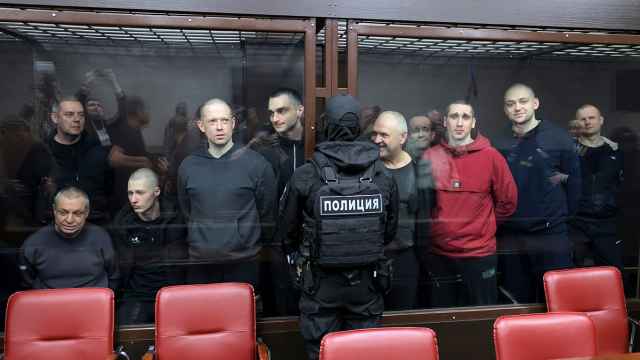President Vladimir Putin's recent decision to launch a government agency charged with maintaining interethnic and interfaith harmony in Russia is a bid to prevent foreign powers and internal opposition factions from seeking to exploit a weak spot in Russia's power structure, analysts told The Moscow Times.
Since the collapse of the Soviet Union, Russia has had a series of state bodies ostensibly designed to deal with ethnic issues. But since 2001, when the Ministry of Federal Affairs, National and Migration Policy was disbanded, the country has lacked a government organ dedicated exclusively to maintaining harmony between Russia's many ethnic groups.
Putin signed an executive order on Tuesday establishing the Federal Agency for Ethnic Affairs (FAEA), 14 years after its predecessor was dissolved. As of late Wednesday, no one had been announced as the director of the agency.
The FAEA will be charged with "[carrying] out measures to strengthen the unity of Russia's multiethnic people, ensure interethnic and interfaith harmony," according to a set of instructions handed down by Putin and then published on the Kremlin's website.
During a meeting Tuesday with Prime Minister Dmitry Medvedev, Putin said he expects that the government will "give this matter significantly more attention. … Russia is a multiethnic nation, home to over 100 ethnic groups, and certain matters are a cause for concern," Putin told Medvedev.
Putin did not go into specifics as to what these matters are, or what had sparked the idea to establish the FAEA at a time when other government structures are freezing their salaries and downsizing their staffs.
Experts who were asked by The Moscow Times what may have triggered the decision to launch the new agency cited the ongoing Ukraine conflict, Russia's economic crisis and the concern that interethnic tensions could be stirred up by forces wishing to politically destabilize Russia.
The Ukraine Shadow
According to Vyacheslav Mikhailov, who served as minister for ethnic and federative affairs in Russia in the 1990s, the Ukraine crisis has provided a clear-cut illustration of what can result from lax ethnic policy.
"The situation in Ukraine shows that the government has to keep these issues under control," said Mikhailov, who also led the Central Committee of the Communist Party's interethnic policy department between 1987 and 1991.
The ouster of Ukraine's former pro-Kremlin President Viktor Yanukovych in February 2014 paved the way toward a violent conflict between Kiev-loyal forces and the largely Russian speaking pro-Moscow population in the eastern regions of Donetsk and Luhansk.
Between 1998 and 1999, Mikhailov served as first deputy chief of Russia's Security Council, where, he said, ethnic issues "were discussed at almost every meeting."
"Russia's integrity depends on these issues, so this is one of the main questions of national security," he said. Over the past decade, Moscow has waged two bloody wars in Chechnya, successfully averting any threat of secession posed by militant separatists in the North Caucasus region, where the majority of residents are ethnic Chechens.
Foreign Threat
As Russia's relations with the West plunge to lows unparalleled in the post-Cold War era, foreign governments may be seeking out ways to exploit Russia's vulnerabilities. The country's profound ethnic diversity could serve as a means for foreign meddling, said Dmitry Zhuravlyov, director of the Institute for Regional Issues, a Moscow-based think tank.
"This is purely my theory, but as we know, ethnic issues have often been used by external forces to destabilize [Russia and the Soviet Union]," Zhuravlyov said in a phone interview.
Next year, Russia will hold federal parliamentary elections, followed in 2018 by the next round of presidential elections. The previous round of national election between 2011 and 2012 was accompanied by massive street protests against Putin and the ruling United Russia party. Putin and other Russian officials blamed the unrest on Western meddling.
According to Zhuravlyov, Putin's aim in launching the new agency may have been to thwart such efforts in the future.
Vladimir Zorin, Russia's last ethnic affairs minister, took this argument a step further by saying the problem of meddling is not limited to foreign powers. Radical opposition activists within the country could likewise attempt to use ethnic divisions in pursuit of power, he said.
"Many opposition members understand that migration and interethnic relations can serve as an instrument that could bring political gains," said Zorin, who served after the dissolution of Russia's Ethnic Affairs Ministry in 2001 as a minister without portfolio, meaning he held the title of minister, but did not manage a ministerial structure.
One of Russia's leading opposition figures, Alexei Navalny, has used divisive terms in the past to speak about Russia's interethnic patchwork.
"You can't have taboo subjects," Navalny told Russian GQ in 2011. "The failure of the liberal-democratic movement [in Russia] was the result of the fact that they considered certain topics too dangerous to talk about, including the topic of national interethnic conflict. We need to admit that migrants, including those from the Caucasus, often come to Russia with their own, specific values."
He went on to talk about the limitations he says are placed on women by Muslims in Chechnya. "I don't like it when people … establish their own rules [in Russia]."
He has consistently voiced support in the past for the annual "Russian March" demonstrations, mass marches in Moscow that trumpet nationalist values.
Meanwhile, Russian society remains broadly unconcerned with the prospect of interethnic tumult.
According to a poll on nationalism, xenophobia and migration conducted in July 2014 by the independent Levada Center, 66 percent of Russians opined that it was unlikely any large-scale violent ethnic conflicts would occur, up from 29 percent one year prior.
Moreover, 71 percent of Russians reported experiencing no ethnic tension in their cities or neighborhoods. That number had surged from 52 percent the previous year.
The poll was conducted among 1,600 respondents with the margin of error not exceeding 3.4 percent, according to the Levada Center.
An October 2014 report on ethnic conflicts compiled by Moscow-based think tank the Center for National Conflicts said the level of interethnic tensions in Russia has "decreased significantly" since April 2014, with the Ukraine crisis overshadowing all other issues.
The report listed the areas with the highest levels of tension as Moscow, a city teeming with migrant workers; Dagestan, the most multiethnic province in the North Caucasus; and the oil-rich Khanty-Mansiysk autonomous district, where ethnically diverse local elites vie for power.
"It's The Economy, Stupid"
The experts agreed that the government may be bracing for the prospect that as Russians get poorer, domestic ethnic tensions will surge.
Falling real incomes and skyrocketing unemployment have traditionally exacerbated ethnic divisions in Russia. For instance, ethnic issues reached a boiling point in the 1990s, when Russia's economy was on the brink of collapse, the analysts said.
"When the quality of people's lives decreases, they seek answers, and they often find them in ethnicity: they look to blame the Jews, people from the Caucasus, the Uzbeks and so on," Mikhailov said.
"Everybody can use ethnic divisions for their own advantage," he said.
A Message from The Moscow Times:
Dear readers,
We are facing unprecedented challenges. Russia's Prosecutor General's Office has designated The Moscow Times as an "undesirable" organization, criminalizing our work and putting our staff at risk of prosecution. This follows our earlier unjust labeling as a "foreign agent."
These actions are direct attempts to silence independent journalism in Russia. The authorities claim our work "discredits the decisions of the Russian leadership." We see things differently: we strive to provide accurate, unbiased reporting on Russia.
We, the journalists of The Moscow Times, refuse to be silenced. But to continue our work, we need your help.
Your support, no matter how small, makes a world of difference. If you can, please support us monthly starting from just $2. It's quick to set up, and every contribution makes a significant impact.
By supporting The Moscow Times, you're defending open, independent journalism in the face of repression. Thank you for standing with us.
Remind me later.






